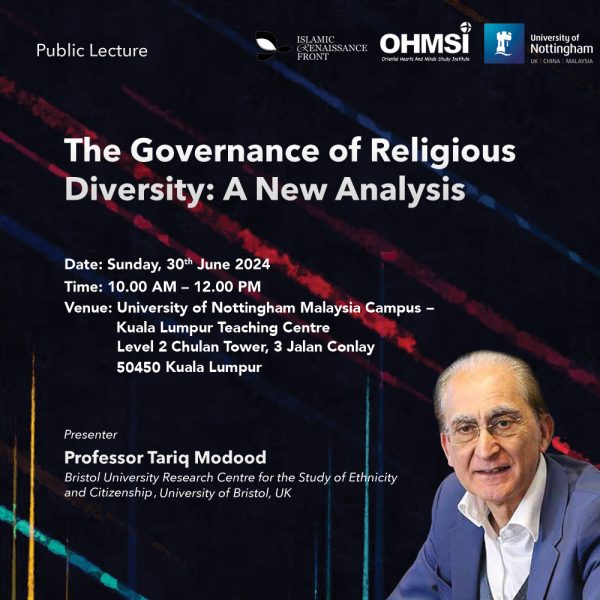
Date: Sunday, 30th June 2024
Time: 10.00 AM – 12.00PM
Venue: University of Nottingham Malaysia Campus – Kuala Lumpur Teaching Centre, Level 2 Chulan Tower, 3 Jalan Conlay, 50450 Kuala Lumpur
Welcoming Speech:
Professor Zaharom Nain
Director of the Centre for the Study of Communications and Culture
University of Nottingham Malaysia Campus
Presenter:
Professor Tariq Modood
Bristol University Research Centre for the Study of Ethnicity and Citizenship=
University of Bristol, UK
Register at: https://docs.google.com/forms/d/e/1FAIpQLScBSiD3-zO2s2HL5eYTebDzaiLBUa5KgOIzmGb0CzpK5Qr5lQ/viewform
This talk is based on the new book with Thomas Sealy, The New Governance of Religious Diversity (Polity, June, 2024). The book has been oriented by two questions: an empirical one of how do states govern religious diversity, and a normative one of how, in our view, religious diversity should be governed. Indeed, our approach is oriented by a position that sees the relationship between the empirical and normative as one of close entwinement.
Eschewing Euro-Americancentric perspectives that define secularism in terms of religious freedom in general or treat a particular country as a paradigm (typically USA or France), we argue there are multiple secularisms, present across different global contexts. Our analytical framework is not designed to merely capture specific countries or enable comparative empirical understanding (https://familyfootcarega.com/education/). It also is the basis for a normative engagement with modes of secularism. This interdisciplinarity is, then, quite different from standard political theory as well as standard political science or political sociology.
We apply it to two regions: to four countries in Western Europe (Belgium, Britain, France and Germany) and three countries in South and South East Asia (India, Indonesia, Malaysia). Our strategy is to approach each region, indeed country, contextually and to argue that both the regions in our study have to be respected as embodying two different modes of governance, ‘moderate secularism’ and ‘pluralistic nationalism’ respectively. We do not rank one over the other or to make one approximate to the other, though we do think each can learn something from the other. We approach that learning by a multicultural normative evaluation, based on an understanding of multiculturalism developed by the Bristol School of Multiculturalism.
Programs
10.00-10.10 AM: Welcoming speech by Prof Zaharom Nain, University of Nottingham
10.10-10.20 AM: Speech by Moderator, Dr KJ John, OHMSI
10.20-11.00 AM: Lecture by Prof. Tariq Modood, University of Bristol
11.00-11.50 PM: Discussion
11.50-12.00 PM: Conclusion by Moderator
Speaker’s Biography
 Tariq Modood is Professor of Sociology, Politics and Public Policy and the founding Director of the Centre for the Study of Ethnicity and Citizenship at the University of Bristol and the co-founder of the international journal, Ethnicities. He has held over 40 grants and consultancies, has over 35 (co-)authored and (co-)edited books and reports and over 350 articles and chapters. He was awarded a MBE for services to social sciences and ethnic relations in 2001, was made a Fellow of the Academy of Social Sciences (UK) in 2004 and elected a Fellow of the British Academy in 2017. In 2022 he was ranked in the top 20 UK cited scholars in Politics, Law, Sociology and Social Policy. He served on the Commission on the Future of Multi-Ethnic Britain, the National Equality Panel, and the Commission on Religion and Belief in British Public Life. His latest books include Essays on Secularism and Multiculturalism (2019), Multiculturalism: A Civic Idea (2nd ed; 2013); and as Special Issues co-editor, with T. Sealy, Beyond Euro-Americancentric Forms of Racism and Anti-racism (Political Quarterly, 2022) and Global comparative analysis of the governance of religious diversity (Religion, State and Society, 2022). He has a You Tube Channel and his website is tariqmodood.com. His latest book, with Thomas Sealy, is The New Governance of Religious Diversity (2024)
Tariq Modood is Professor of Sociology, Politics and Public Policy and the founding Director of the Centre for the Study of Ethnicity and Citizenship at the University of Bristol and the co-founder of the international journal, Ethnicities. He has held over 40 grants and consultancies, has over 35 (co-)authored and (co-)edited books and reports and over 350 articles and chapters. He was awarded a MBE for services to social sciences and ethnic relations in 2001, was made a Fellow of the Academy of Social Sciences (UK) in 2004 and elected a Fellow of the British Academy in 2017. In 2022 he was ranked in the top 20 UK cited scholars in Politics, Law, Sociology and Social Policy. He served on the Commission on the Future of Multi-Ethnic Britain, the National Equality Panel, and the Commission on Religion and Belief in British Public Life. His latest books include Essays on Secularism and Multiculturalism (2019), Multiculturalism: A Civic Idea (2nd ed; 2013); and as Special Issues co-editor, with T. Sealy, Beyond Euro-Americancentric Forms of Racism and Anti-racism (Political Quarterly, 2022) and Global comparative analysis of the governance of religious diversity (Religion, State and Society, 2022). He has a You Tube Channel and his website is tariqmodood.com. His latest book, with Thomas Sealy, is The New Governance of Religious Diversity (2024)
Jointly organized by: Islamic Renaissance Front (IRF), OHMSI & University of Nottingham Malaysia

